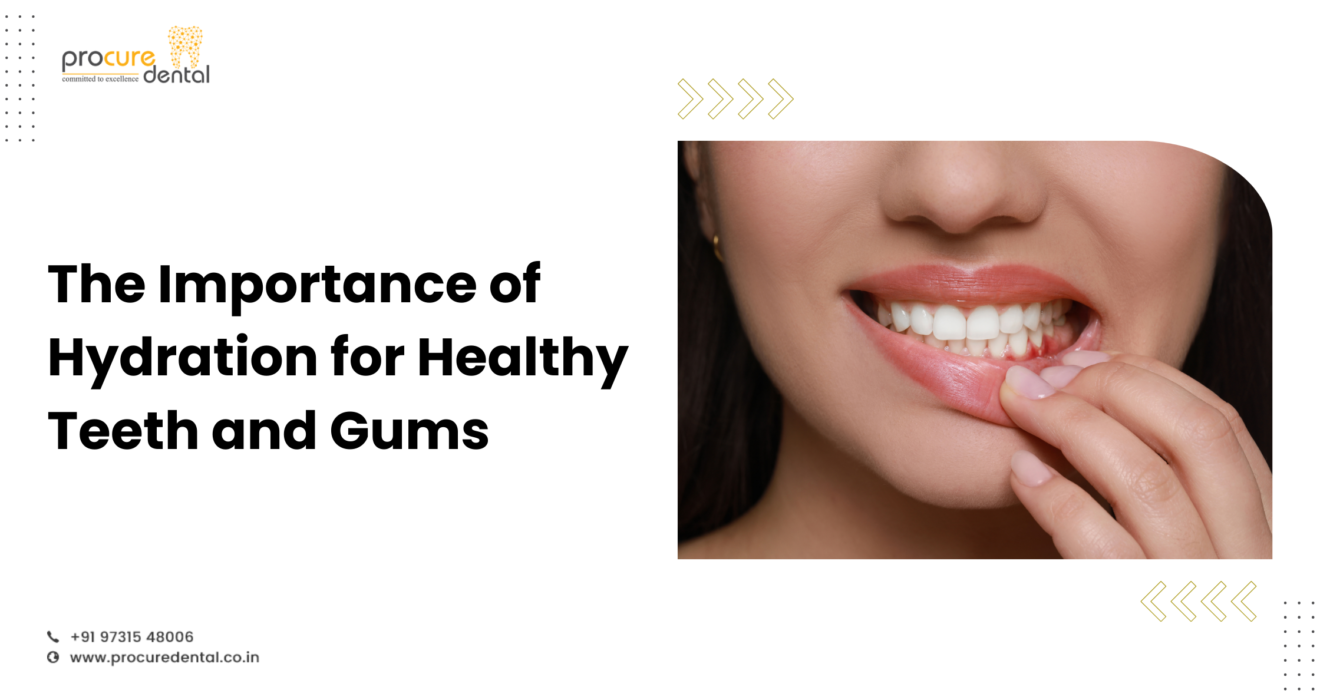The Importance of Hydration for Healthy Teeth and Gums
When it comes to maintaining healthy teeth and gums, hydration is often an overlooked but crucial element. While brushing, flossing, and regular dental check-ups are well-known practices for oral health, staying adequately hydrated plays a vital role in keeping your mouth healthy. Let’s dive into why hydration is so important for your teeth and gums and how you can ensure you’re getting enough water to support your oral health.
How Hydration Affects Oral Health
Saliva Production
- Natural Cleanser: Saliva is your mouth’s first line of defense against tooth decay and gum disease. It helps wash away food particles and bacteria, neutralizes acids produced by bacteria in the mouth, and provides disease-fighting substances throughout the mouth.
- Promotes Remineralization: Saliva contains minerals such as calcium and phosphate that help repair early tooth decay and maintain strong tooth enamel.
Preventing Dry Mouth
- Dry Mouth Consequences: When you’re dehydrated, your saliva production decreases, leading to a condition known as xerostomia or dry mouth. Dry mouth can cause discomfort, bad breath, and an increased risk of cavities and gum disease.
- Comfort and Functionality: Staying hydrated ensures that your mouth stays moist, which is essential for speaking, chewing, and swallowing comfortably.
Gum Health
- Hydrated Gums: Proper hydration helps keep the gums healthy and pink. Dehydrated gums can become dry, swollen, and more susceptible to infection.
- Reduced Inflammation: Drinking enough water helps reduce inflammation in the gums, which can prevent gum diseases like gingivitis and periodontitis.
The Benefits of Staying Hydrated for Oral Health
Enhanced Saliva Production
- Consistent Moisture: Drinking water consistently throughout the day helps maintain adequate saliva levels, ensuring your mouth remains moist and clean.
- Better Digestion: Adequate saliva production aids in the initial stages of digestion, making it easier for your stomach to process food.
Improved Breath
- Fresher Breath: Proper hydration helps wash away food particles and bacteria that cause bad breath, leaving your mouth fresher for longer.
- Dilution of Odor-Causing Compounds: Drinking water dilutes the concentration of odor-causing compounds in the mouth, reducing the risk of halitosis.
Stronger Teeth and Gums
- Mineral Supply: Water, especially fluoridated water, provides essential minerals that strengthen teeth and help prevent decay.
- Healthy Gum Tissue: Hydrated gums are more resilient and less prone to bleeding and infection.
Detoxification
- Flush Out Toxins: Water helps flush out toxins from the body, including the mouth, which can otherwise contribute to oral health problems.
- Improved Overall Health: Good hydration supports overall health, which in turn positively impacts oral health. A healthy body is better equipped to fight off infections, including those that affect the gums.
Tips for Staying Hydrated
Drink Plenty of Water
- Daily Intake: Aim to drink at least eight 8-ounce glasses of water a day, more if you are physically active or live in a hot climate.
- Hydration Habits: Carry a water bottle with you throughout the day to remind yourself to drink water regularly.
Limit Dehydrating Beverages
- Reduce Caffeine and Alcohol: Caffeinated and alcoholic beverages can dehydrate the body. Try to limit these and drink water alongside them to maintain hydration.
- Avoid Sugary Drinks: Sugary beverages like soda and juice can contribute to tooth decay. Water is a much healthier option for your teeth.
Eat Water-Rich Foods
- Hydrating Foods: Include water-rich foods in your diet, such as fruits (like watermelon and oranges) and vegetables (like cucumbers and celery).
- Balanced Diet: A balanced diet with plenty of fresh produce helps maintain hydration levels and provides essential nutrients for oral health.
Monitor Your Hydration
- Check Urine Color: A simple way to monitor your hydration status is by the color of your urine. Pale yellow indicates proper hydration, while dark yellow or amber suggests you need more water.
- Listen to Your Body: Pay attention to signs of dehydration, such as dry mouth, headache, dizziness, or fatigue, and increase your water intake accordingly.
Conclusion
Hydration plays a critical role in maintaining healthy teeth and gums. By ensuring you drink enough water, you support saliva production, prevent dry mouth, and promote overall oral hygiene. Combined with regular dental care practices, staying hydrated is a simple yet powerful way to keep your smile healthy and bright. So, grab that water bottle and drink up—for your teeth and gums!



